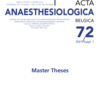Sevoflurane in COVID19 patients: a prospective observational pilot study
Covid-19; coronavirus infection Pneumonia; viral respiratory insufficiency; respiratory distress syndrome SARS-CoV-2 anaesthetics; inhalation Sevoflurane / administration & dosage
Published online: Apr 21 2022
Abstract
Background: The SARS-cOV-2 virus has led to a global pandemic with acute respiratory failure as a major cause of admission to the ICU with many severely affected patients requiring invasive ventilation. High sedation requirements and high airway reactivity, in combination with drug shortages inspired us to seek alternative options for sedation.
Methods: A single center, prospective observational pilot study with the inclusion of 7 COVID-19 patients. All mechanically ventilated patients received a standardized sedation protocol which was upscaled when signs of asynchrony with the ventilator were observed. This was quantified by high ventilatory peak airway pressures (> 35 cmH20) and the necessity of paralytics. Data retrieval started as soon as sevoflurane was introduced using a self-controlled case series methodology.
Results: Once sevoflurane was added to the sedation protocol, other intravenous sedatives were stopped until patients were sedated only by inhaled anaesthetic in combination with an opiate and/or clonidine. The mean time from starting sevoflurane to achieving dual sedation was 47h. The daily number of high peak airway pressure alarms were significantly lower once sevoflurane was initiated. (p<0,01) Additionally, there was a significant reduction in the daily use of neuromuscular blockers (p<0,01). Initiation of sevoflurane did not show significantly improved oxygenation measured by P/F ratio in this limited sample of patients (p=0,67).
Conclusions: Sevoflurane may be a good sedative and alternative in intubated patients with COVID-19 ARDS, improving synchrony with the ventilator. Larger, randomized trials are necessary.
